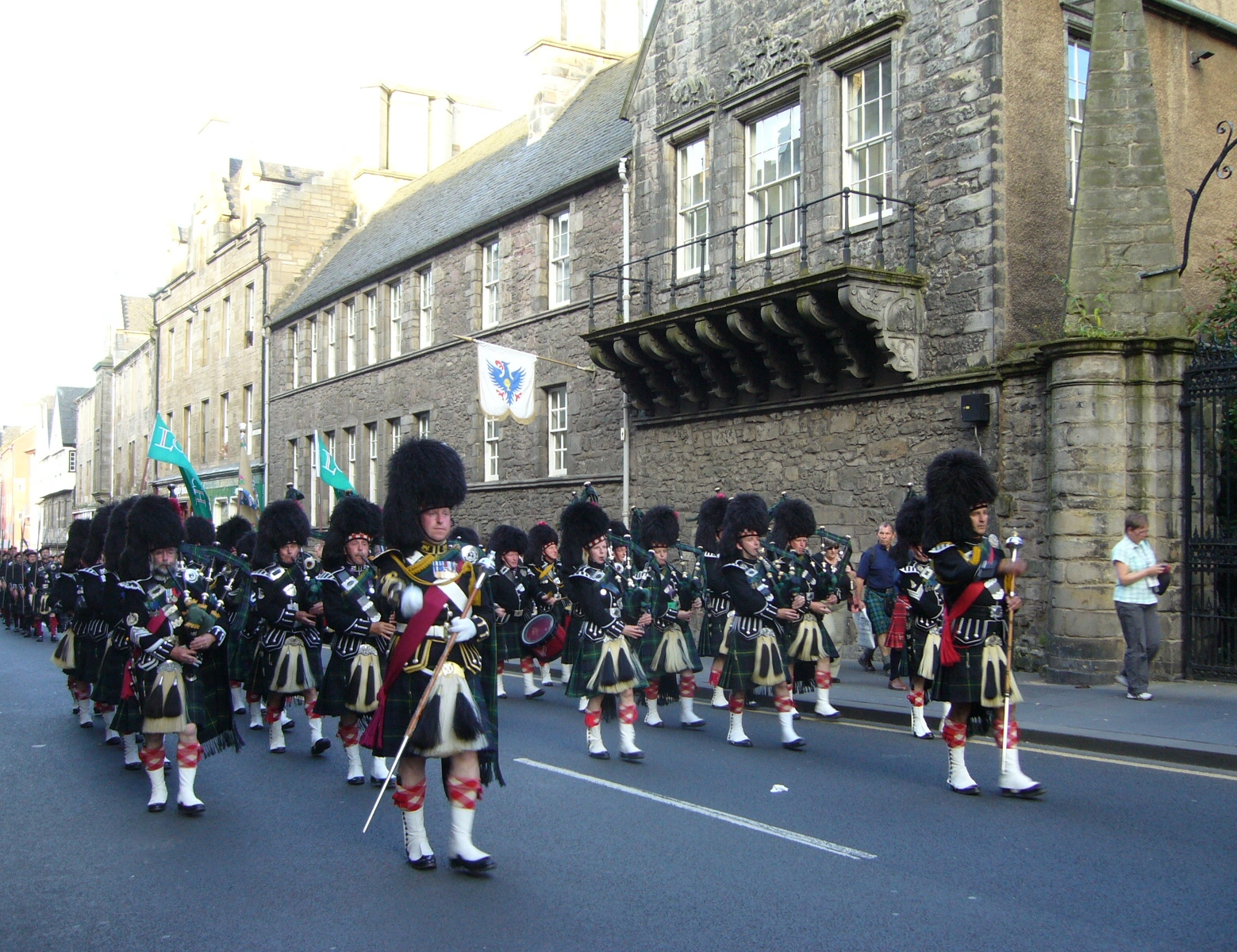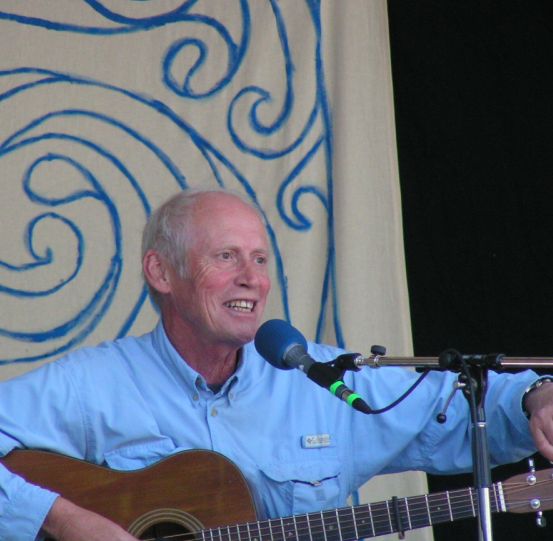|
The Promise Of The Day
''The Promise of the Day'' is a music album by the band The Corrie Folk Trio and Paddie Bell. The album was produced in 1965. Overview The title of the album is a line from "The Uist Tramping Song". It was their first album in stereo and "The Uist Tramping Song" gives the three male voices very distinct stereo separation. On this album there are two sea shanties, and only one Jacobite song. For the first time Roy Williamson is given a lead vocal (Verdant Braes O' Screen) but his voice is weak compared to later albums. In the liner lines by W Gordon Smith he is cast in the role of an absent-minded scholar. Paddie Bell sings "Fear A Bhata", with the chorus in Gaelic. Their singing of "Killiecrankie" was recorded on film and broadcast on " The White Heather Club" at about the time that this album was recorded. Track listing # My Love She's But A Lassie Yet # Shoals O' Herrin' (Ewan MacColl) # The Trooper and the Maid hild Ballad 299# Whistling Gypsy hild Ballad 200# Queen Mary ... [...More Info...] [...Related Items...] OR: [Wikipedia] [Google] [Baidu] |
The Corries
The Corries were a Scottish folk group that emerged from the Scottish folk revival of the early 1960s. The group was a trio from their formation until 1966 when founder Bill Smith left the band but Roy Williamson and Ronnie Browne continued as a duo until Williamson's death in 1990. They are particularly known for the song "Flower of Scotland", written by Williamson, which has become an unofficial national anthem of Scotland. History Early years In the early 1960s, Bill Smith (born in 1936 in Edinburgh), Ron Cruikshank and Andy Turner had formed a trio called The Corrie Voices. The trio was named after Smith's daughter, Corrie Smith, but because a corrie is a deep bowl in a mountain, the name was particularly appropriate as it evokes imagery of the Scottish landscape. After Turner dropped out in 1962, Roy Williamson teamed up with Smith and Cruikshank to form the Corrie Folk Trio. Their first performance was in the Waverley Bar in St Mary's Street, Edinburgh. After a few we ... [...More Info...] [...Related Items...] OR: [Wikipedia] [Google] [Baidu] |
Scottish Folk Music
Scottish folk music (also Scottish traditional music) is a genre of folk music that uses forms that are identified as part of the Scottish musical tradition. There is evidence that there was a flourishing culture of popular music in Scotland during the late Middle Ages, but the only song with a melody to survive from this period is the "Pleugh Song". After the Reformation, the secular popular tradition of music continued, despite attempts by the Kirk, particularly in the Lowlands, to suppress dancing and events like penny weddings. The first clear reference to the use of the Highland bagpipes mentions their use at the Battle of Pinkie Cleugh in 1547. The Highlands in the early seventeenth century saw the development of piping families including the MacCrimmons, MacArthurs, MacGregors and the Mackays of Gairloch. There is also evidence of adoption of the fiddle in the Highlands. Well-known musicians included the fiddler Pattie Birnie and the piper Habbie Simpson. This tradition ... [...More Info...] [...Related Items...] OR: [Wikipedia] [Google] [Baidu] |
The Corrie Folk Trio And Paddie Bell
''The Corrie Folk Trio and Paddie Bell'' is the eponymous 1964 album by The Corrie Folk Trio and Paddie Bell. Musical style The most vigorous song on this album is "Greenland Fisheries" with Ronnie Browne shouting "There She Blows" at the start of the song, at the top of his voice. "Jock O' Braidislee" is sung unaccompanied by Ronnie Browne. Paddie Bell sings "Lord Gregory" with only her banjo for accompaniment. The album begins with four songs associated with the game of two balls and a wall. Track listing #The Singing Games. (a) The Windy City (I'll Tell Me Ma) (b) Call on the one you love (c) 1 2 3 O'Leary (d) I'm No Goin' Tae Barry's Trip # Lock The Door, Lariston # Jock o' Braidislee (solo by Ronnie Browne) #Doodle Let Me Go (Yellow Girls) (vocal by Paddie Bell) # The Lass O' Fyvie #The Itinerant Cobbler # Lord Gregory (vocal by Paddie Bell) hild Ballad 76#McPherson's Farewell #Coorie Doon (vocal by Paddie Bell)(written by Matt McGinn) #Greenland Fisheries ''Note'': The ... [...More Info...] [...Related Items...] OR: [Wikipedia] [Google] [Baidu] |
Album
An album is a collection of audio recordings issued on compact disc (CD), Phonograph record, vinyl, audio tape, or another medium such as Digital distribution#Music, digital distribution. Albums of recorded sound were developed in the early 20th century as individual Phonograph record#78 rpm disc developments, 78 rpm records collected in a bound book resembling a photograph album; this format evolved after 1948 into single vinyl LP record, long-playing (LP) records played at revolutions per minute, rpm. The album was the dominant form of recorded music expression and consumption from the mid-1960s to the early 21st century, a period known as the album era. Vinyl LPs are still issued, though album sales in the 21st-century have mostly focused on CD and MP3 formats. The 8-track tape was the first tape format widely used alongside vinyl from 1965 until being phased out by 1983 and was gradually supplanted by the cassette tape during the 1970s and early 1980s; the populari ... [...More Info...] [...Related Items...] OR: [Wikipedia] [Google] [Baidu] |
The White Heather Club
''The White Heather Club'' was a BBC TV Scottish variety show that ran on and off from 7 May 1958 to 11 April 1968 History It was an early evening BBC television programme. It started at 6.20, and Jimmy Shand composed a melody "The Six Twenty Twostep" as the theme tune. This was usually followed by Andy Stewart singing "Come in, come in, it's nice to see you...." The show always ended with Andy Stewart and the cast singing, "Haste ye Back": Robert Wilson, who in 1957 had been leading ''The White Heather Group'', was an early presenter of the club and recorded with them. The show was so successful that in the early 1960s there was a company touring Scottish theatres, containing many of the performers. The show was broadcast from Glasgow, at that time the only large TV studio in Scotland, and produced by Iain MacFadyen, who went on to become the Head of Light Entertainment for BBC Scotland. [...More Info...] [...Related Items...] OR: [Wikipedia] [Google] [Baidu] |
Ewan MacColl
James Henry Miller (25 January 1915 – 22 October 1989), better known by his stage name Ewan MacColl, was a folk singer-songwriter, folk song collector, labour activist and actor. Born in England to Scottish parents, he is known as one of the instigators of the 1960s folk revival as well as for writing such songs as "The First Time Ever I Saw Your Face" and "Dirty Old Town". MacColl collected hundreds of traditional folk songs, including the version of " Scarborough Fair" later popularised by Simon & Garfunkel, and released dozens of albums with A.L. Lloyd, Peggy Seeger and others, mostly of traditional folk songs. He also wrote many left-wing political songs, remaining a steadfast communist throughout his life and engaging in political activism. Early life and early career MacColl was born as James Henry Miller at 4 Andrew Street, in Broughton, Salford, England, to Scottish parents, William Miller and Betsy (née Henry), both socialists. William Miller was an iron moulde ... [...More Info...] [...Related Items...] OR: [Wikipedia] [Google] [Baidu] |
Black Jack Davey
"The Raggle Taggle Gypsy" (), is a traditional folk song that originated as a Scottish border ballad, and has been popular throughout Britain, Ireland and North America. It concerns a rich lady who runs off to join the gypsies (or one gypsy). Common alternative names are "Gypsy Davy", "The Raggle Taggle Gypsies O", "The Gypsy Laddie(s)", "Black Jack David" (or "Davy") and "Seven Yellow Gypsies". In the folk tradition the song was extremely popular, spread all over the English-speaking world by broadsheets and oral tradition. According to Roud and Bishop,"Definitely in the top five Child ballads in terms of widespread popularity, and possibly second only to 'Barbara Allen', the Gypsies stealing the lady, or, to put it the other way round, the lady running off with the sexy Gypsies, has caught singers' attention all over the anglophone world for more than 200 years. For obvious reasons, the song has long been a favourite with members of the travelling community." Synopsis The core ... [...More Info...] [...Related Items...] OR: [Wikipedia] [Google] [Baidu] |
Uist Tramping Song
The "Uist Tramping Song", "Null do dh'Uidhist" ''(Over to Uist)'' or "Tiugainn Leam" ''(Come With Me)'' is a traditional Scottish folk song, Gaelic lyrics by Archibald MacDonald, music by John R. Bannerman, arranged by Hugh S. Roberton. The song is an invitation to the sights and abundance of Uist, the central group of islands in the Outer Hebrides. The English language version tells of hiking there. Artists who have recorded this song include Kenneth McKellar (singer), Kenneth McKellar, Robert Wilson (tenor), Robert Wilson and Robert Rees (singer), Robert Rees. Other notable recorded versions, include: *The Corrie Folk Trio and Paddie Bell on the album ''The Promise of the Day'' (1965) *David Solley on the album ''Great Songs of Scotland'' (1987) *Moira Anderson on the album ''A Land for All Seasons'' (1996) *Jackie Leven on the album ''For Peace Comes Dropping Slow'' (1998) References External links Song lyrics at Poetryofscotland.co.uk Scottish folk songs Year of song mis ... [...More Info...] [...Related Items...] OR: [Wikipedia] [Google] [Baidu] |
Archie Fisher
Archie Macdonald Fisher (born 23 October 1939) is a Scottish folk singer and songwriter. He has released several solo albums since his first, eponymous album, in 1968. Fisher composed the song "The Final Trawl", recorded on the album ''Windward Away'', that several other groups and singers, including The Clancy Brothers, have also recorded. Starting in the mid-1970s, he produced four folk albums with Makem and Clancy. He also performed with them and other groups as a backup singer and guitarist. He hosted his own radio show on BBC Radio Scotland for almost three decades. Early life Archie Fisher was born in Glasgow on 23 October 1939 into a large singing family. His sister Cilla Fisher is also a professional singer, as was his late sister Ray. In 1960 he moved to Edinburgh and appeared regularly at "The Howff" folk club run by Roy Guest. In 1962 Ray and Archie released the single "Far Over the Forth" on the Topic Records label and appeared on the BBC ''Hootenanny'' programme ... [...More Info...] [...Related Items...] OR: [Wikipedia] [Google] [Baidu] |
The Corries Albums
''The'' () is a grammatical article in English, denoting persons or things that are already or about to be mentioned, under discussion, implied or otherwise presumed familiar to listeners, readers, or speakers. It is the definite article in English. ''The'' is the most frequently used word in the English language; studies and analyses of texts have found it to account for seven percent of all printed English-language words. It is derived from gendered articles in Old English which combined in Middle English and now has a single form used with nouns of any gender. The word can be used with both singular and plural nouns, and with a noun that starts with any letter. This is different from many other languages, which have different forms of the definite article for different genders or numbers. Pronunciation In most dialects, "the" is pronounced as (with the voiced dental fricative followed by a schwa) when followed by a consonant sound, and as (homophone of the archaic ... [...More Info...] [...Related Items...] OR: [Wikipedia] [Google] [Baidu] |




.png)